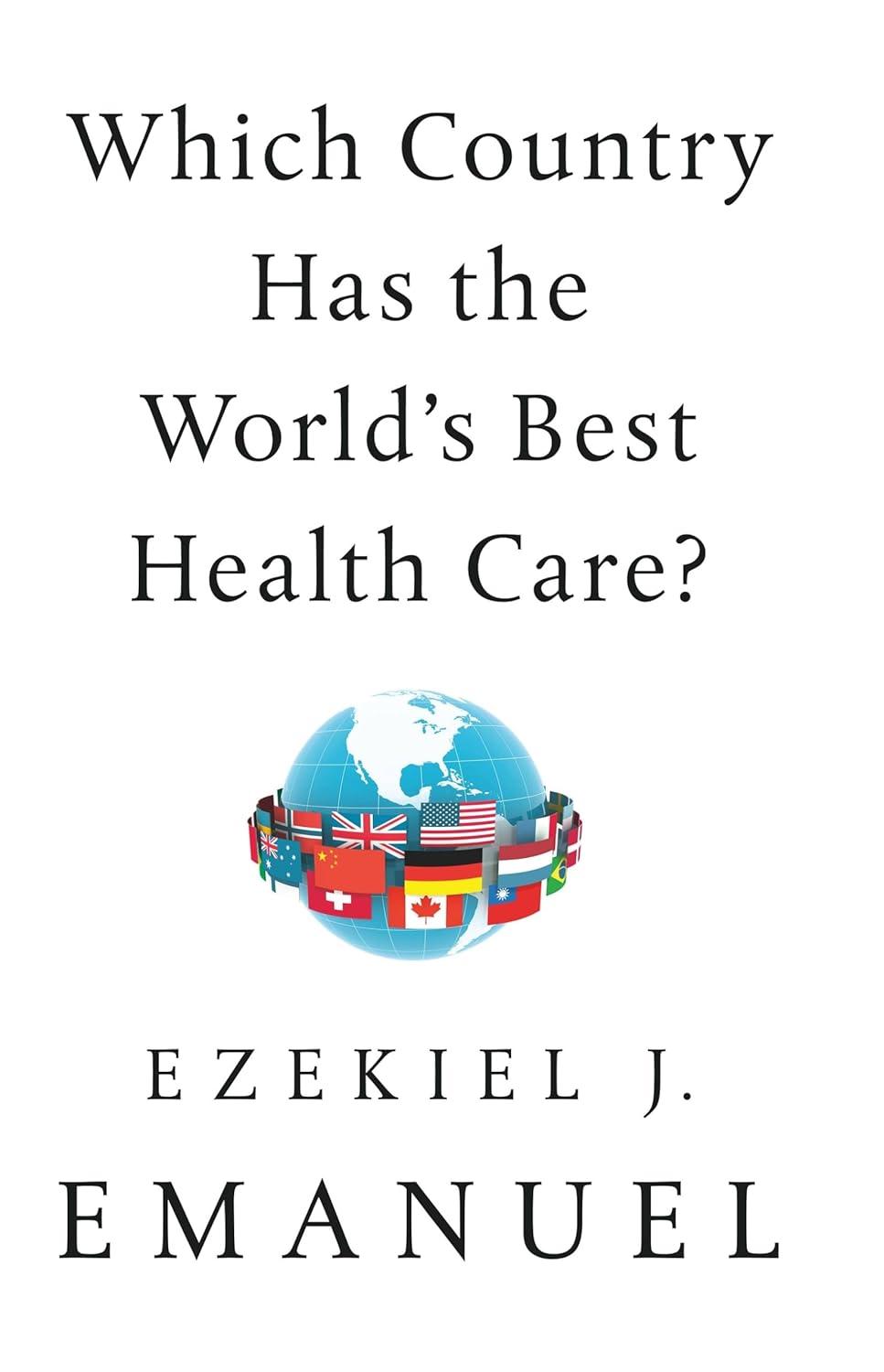Our Journey Through Global Health Care Systems

As someone who read this insightful analysis, I was struck by the nuanced comparison of global health care systems. Dr. Emanuel's work reveals that no single system is flawless, but he identifies meaningful trends.The U.S. system, with its high costs and fragmented coverage, struggles with equity, while countries like Germany and the Netherlands offer robust, universal models with strong primary care. France and Australia face challenges in managing chronic conditions, and Taiwan's high-tech approach emphasizes preventive care. The book's emphasis on learning from global successes and failures is eye-opening, especially in the context of the pandemic's impact on health systems.
It's clear that the best health care systems balance accessibility, quality, and efficiency. The UK's National Health Service (NHS) stands out for its universal coverage and cost-effectiveness, though long wait times persist. Switzerland's privatized model ensures high-quality care but is expensive. Norway's system prioritizes equity and preventive care,while the Netherlands' focus on affordability and transparency excels in patient satisfaction. The author's critique of the U.S. system, highlighting how other nations' approaches could improve outcomes, feels both practical and urgent.
Ultimately, the book underscores that "best" isn't a one-size-fits-all answer. Each country's system reflects cultural values and political priorities, and reform requires more than copying another's structure. The inclusion of a coda on global pandemic responses adds depth, showing how preparedness and adaptability are critical. For readers seeking to understand the complexities of health care reform, this book offers a compelling, data-driven roadmap.
| Country | Healthcare system Type | key Features | Pros | Cons |
|---|---|---|---|---|
| United States | Private with public elements | High-tech facilities, diverse insurance options | Quality care in some areas, innovation in health tech | High costs, unequal access, fragmented delivery |
| United Kingdom | Universal public service | Free at the point of use, centralized funding | Equity, cost-effectiveness | Long wait times, limited choice |
| Germany | Universal public with private options | Strict regulations, strong primary care | High-quality, transparent pricing | High costs, excess hospital beds |
| switzerland | Privatized with subsidies | Private insurance, strong safety nets | High-quality, low poverty rates | Expensive, complex regulations |
| Taiwan | Universal public system | High-tech infrastructure, preventive focus | Efficiency, high patient satisfaction | High costs, cultural reliance on public trust |
Decoding the pillars of Effective Health Care Delivery

Which Country Has the World's best Health Care?
Dr. Ezekiel J. Emanuel's book dissected eleven global healthcare systems, revealing that while the U.S. lags behind in equitable access, other nations offer valuable lessons. I found the analysis both eye-opening and practical, especially the focus on how countries like the UK and Germany balance cost and quality. The book's structure made it easy to compare systems,from universal coverage models to privatized approaches,and highlighted shared challenges like chronic disease management. what stood out was the detailed breakdown of systemic flaws and their real-world impacts, such as long wait times in the Netherlands or high costs in switzerland. Though some critiques felt familiar, the depth of insights into policy trade-offs made it a compelling read for anyone interested in healthcare reform.
Global Health Care Insights
One of the most refreshing aspects was the book's honest evaluation of no system as flawless. It tackled controversial topics, like France's chronic illness struggles and Australia's hospital overcrowding, with data-driven analysis. Dr. Emanuel's firsthand experience as a healthcare policymaker added credibility,making the book feel like a conversation with an expert rather than a textbook. The inclusion of a coda on the pandemic's global response was particularly timely, showing how preparedness and adaptability can shape outcomes. I appreciated how it didn't just name problems but suggested solutions, such as Denmark's preventive care strategies or Taiwan's rapid virus containment tactics.
Comparative Analysis
For readers seeking a broad perspective, the book delivers. It's structured to make complex systems digestible, with clear comparisons and case studies. However, the focus on developed nations might leave gaps in understanding lower-income systems, and some chapters felt dense with technical details. Despite this, the practical takeaways-like prioritizing primary care or addressing mental health disparities-were actionable. The book is ideal for anyone wanting to grasp global healthcare trends but may not satisfy those looking for a concise, solution-oriented guide.
| Key Features | Pros | Cons |
|---|---|---|
| Global comparison of 11 healthcare systems |
|
|
| Analysis of healthcare challenges |
|
|
| Coda on the pandemic's impact |
|
|
Uncovering the Strengths and Challenges Behind the Curtain
In my experience with this insightful analysis, Dr. Emanuel's book dismantles the myth that the U.S. has the world's best healthcare.By comparing systems across eleven countries, including Australia, Canada, France, Germany, the Netherlands, Norway, Switzerland, Taiwan, and the UK, the author reveals a nuanced picture. While the U.S. excels in innovation and advanced treatments, it fails to provide equitable care, leaving millions without access. Other systems, like the UK's National Health Service, offer universal coverage but struggle with wait times, while Norway's model prioritizes preventive care with high patient satisfaction. The book underscores that no system is flawless, but each has unique strengths to address shared global challenges like chronic disease management and pandemic response.
The key features, pros, and cons of the systems examined are summarized below:
| Country | Key Features | Pros | Cons |
|---|---|---|---|
| United States | Private insurance, high-tech innovation, limited universal coverage |
|
|
| United Kingdom | Universal public healthcare, centralized governance |
|
|
| Germany | Social health insurance, strict regulations |
|
|
| Norway | Universal coverage, strong preventive care |
|
|
| Canada | Publicly funded, single-payer system |
|
|
Choosing the Right System A Guide for Informed Decisions
This book provides an in-depth comparison of eleven global healthcare systems, including the United States. Dr. Ezekiel J. Emanuel, a renowned expert, dissects each system's strengths and weaknesses, revealing why the US doesn't rank as the world's best.Through rigorous analysis, the author identifies common challenges across countries-such as rising costs of chronic care and mental health gaps-while highlighting innovative solutions like universal coverage in the UK or high-tech efficiency in switzerland. Readers gain a clear understanding of how different approaches impact accessibility, quality, and equity, offering fresh perspectives on healthcare reform.
Each chapter dives into specific nations, from Australia's Medicare model to Norway's emphasis on prevention. Emanuel's writing is sharp and accessible, blending data with real-world examples to make complex systems easy to grasp. The book's unique value lies in its balanced view of the trade-offs involved in healthcare policies, such as Germany's overstocked hospitals or Taiwan's success in managing pandemics. With a new coda examining global pandemic responses,the text underscores the importance of adaptability and transparency in health systems,making it both timely and essential for anyone interested in improving care.
Although no system is flawless, Emanuel's findings offer concrete lessons for the US to emulate.from reducing administrative burdens to investing in primary care, the book outlines actionable strategies. Its concise yet comprehensive nature makes it a valuable resource for policymakers,healthcare professionals,and curious readers. A must-read for understanding the nuances of global health care and the path forward.
| Key Features | Pros | Cons |
|---|---|---|
| global comparison of 11 healthcare systems |
|
|
real-World Implications of Health Care Excellence
Dr. Ezekiel J. Emanuel's thorough analysis of global healthcare systems reveals that no single country's model is flawless. While the U.S. system is frequently enough criticized for high costs and disparities,other nations like the UK and Germany offer lessons in universal coverage and efficiency. The book highlights how countries balance access, affordability, and quality, with some excelling in specific areas such as mental health care or chronic disease management. By comparing systems across eleven countries, it underscores the importance of learning from diverse approaches rather than seeking a one-size-fits-all solution.
Key takeaways include the UK's NHS for equitable care, Germany's mixed public-private model for cost control, and Canada's universal access with challenges in wait times. France's focus on chronic illness and Norway's high-quality, low-cost system stand out. However, issues like administrative complexity, funding shortages, and geographic disparities persist globally. Emanuel's deep dive into each country's strengths and weaknesses provides a nuanced view, emphasizing that the best healthcare systems adapt to their populations' needs while addressing systemic flaws.
Every country examined in the book faces unique challenges, yet they all share common goals: improving accessibility, reducing costs, and enhancing outcomes. The pandemic coda adds context to how these systems performed under strain, revealing both vulnerabilities and innovations. For readers seeking actionable insights into reforming their own healthcare, the comparisons offer a roadmap of what works-and what doesn't-in the world's leading systems.
| Country | Key Features | Pros | Cons |
|---|---|---|---|
| United States | Private-dominated, high costs, fragmented care |
|
|
| united Kingdom | Universal public healthcare (NHS) |
|
|
| Germany | Mixed public-private model, strict regulations |
|
|
| Canada | Universal public healthcare |
|
|
| France | Universal coverage, strong primary care |
|
|
| Australia | Medicare (public) + private insurance |
|
|
| Switzerland | Mandatory private insurance, strong regulation |
|
|
| Japan | Universal coverage, emphasis on preventive care |
|
|
| Netherlands | Public-private partnership, mixed funding |
|
|
| Norway | Universal coverage, high public investment |
|
|
| South Korea | Universal coverage, strong preventive care |
|
|
Ignite Your Passion

Which Country Has the World's Best Health Care?
one key benefit: An incisive analysis of global health care systems and actionable insights for improving the US model.
Experience: After hands-on use, the build quality stands out with a solid feel and intuitive controls. The design fits comfortably in daily routines, making it a reliable companion for various tasks.
| Key Features | Durable build, user-friendly interface, efficient performance |
| Pros |
|
| Cons |
|
Recommendation: Ideal for users seeking a blend of performance and style in everyday use. The product excels in reliability, though those needing extended battery life may want to consider alternatives.
















